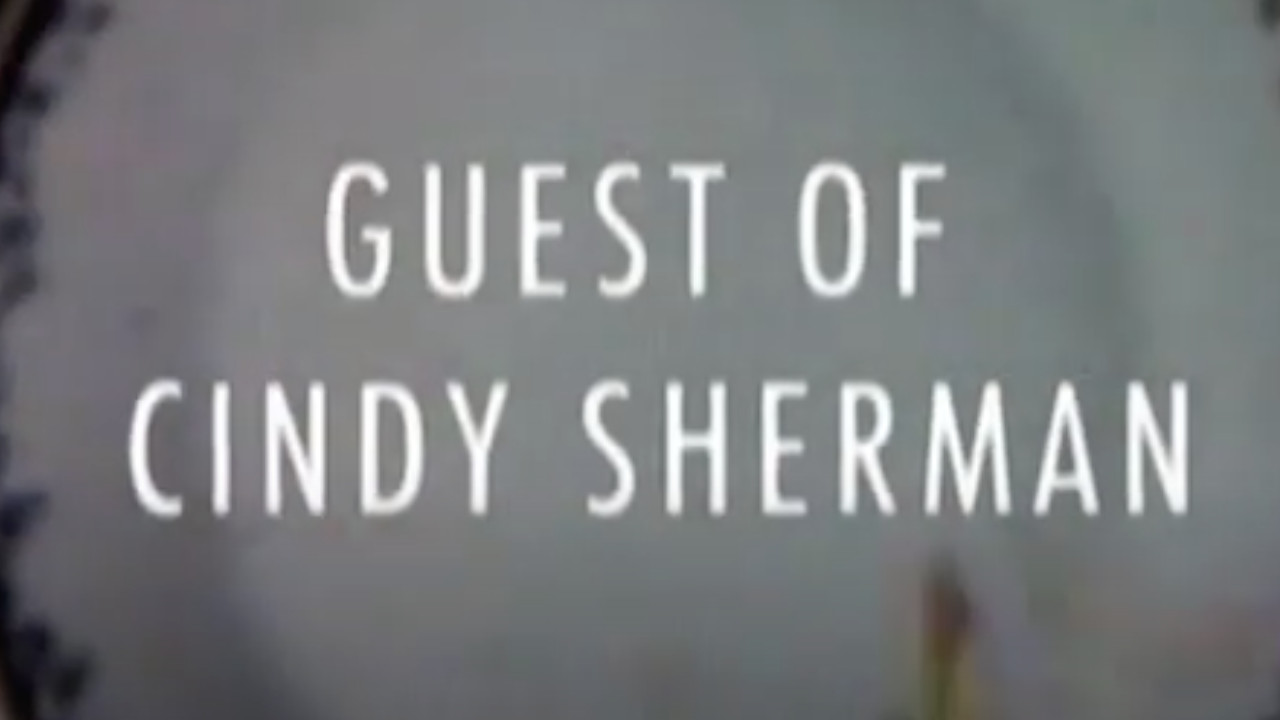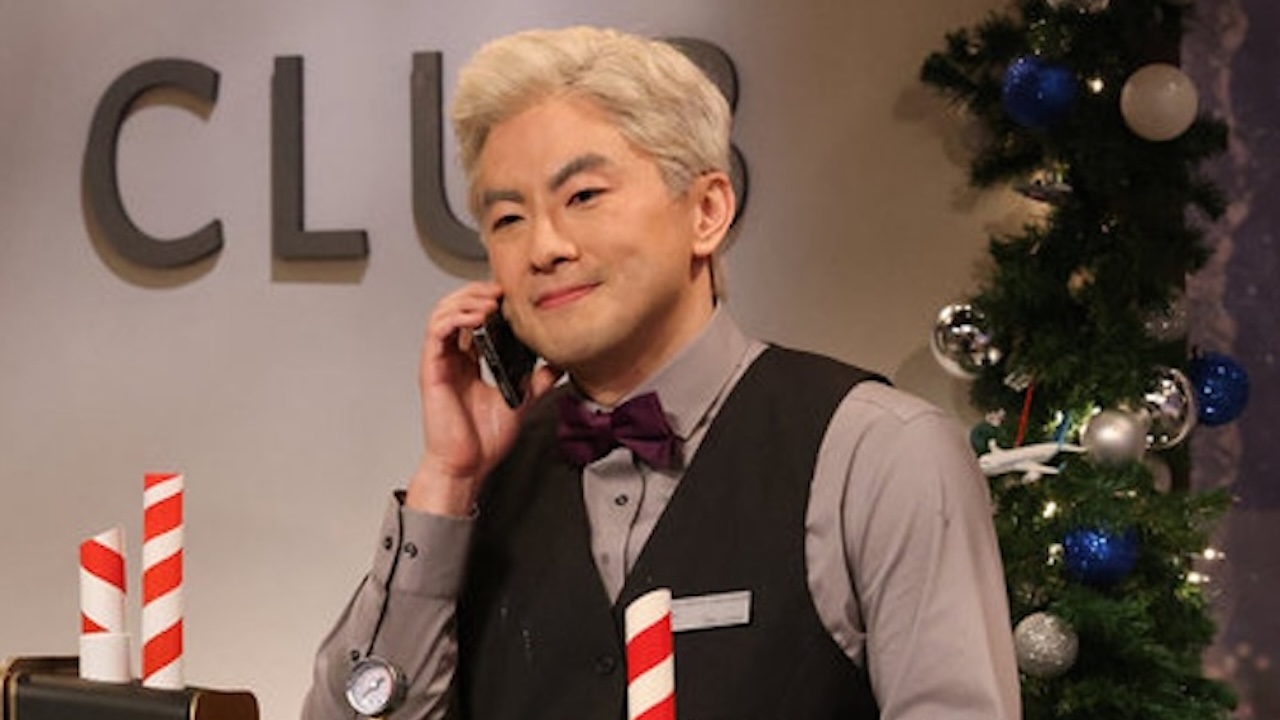Interview: Guest Of Cindy Sherman Director Tom Donahue

Your Daily Blend of Entertainment News
You are now subscribed
Your newsletter sign-up was successful
The new documentary Guest of Cindy Sherman takes a subject as strange and imposing as New York's art world, and puts it in a context pretty much anyone can understand: a love story. The poster for the movie, at right, says everything you need to know. This is a story about a man, Paul H-O, and a woman, Cindy Sherman, whose fame was so great when they met that her shadow swallowed him up entirely.
But that wasn't the movie that Tom Donahue started to make when he met Paul H-O in 2003, and the two of them began to collaborate and tell a story about what it's like to perpetually be the "plus-one" to your more famous significant other. Sherman had been a famous visual artist since the mid-80s, known for photographing herself in costumes that rendered her unrecognizable, but as a recognizable type of woman. When Paul met Cindy in the late 90s, he had spent the last 15 years making the public access show Gallery Beat, in which he and his friends went to gallery openings, met the art stars, and took the whole industry from a decidedly light approach. But when Paul and Cindy became an item, and the open 90s art world morphed into the corporate-funded behemoth of the new decade, Gallery Beat shut down, and Paul found himself searching for meaning in Cindy Sherman's shadow.
I spoke to Tom Donahue last week about his experience making the movie, which opens this Friday in New York City and will roll out to other cities and film festivals over the next few weeks.
How did you get involved in making this film with Paul?
In 2003, I got a call from [photographer and artist] Spencer Tunyk. Spencer said 'Tom, there's this guy Paul H-O, he sublets Cindy Sherman's studio with me, he's her lover, and he fell in love with her on video tape, it's really cool material. Maybe the two of you could get together and you could make something out of it.' I saw the material, and I thought, there's something here, but it's not a movie.
Did Paul already have the idea to make a movie?
No. Spencer thought if he could get us together, we could do like Gallery Beat-meets-Cindy Sherman. I think Paul did have an idea to something, but Spencer was like, you should get this guy Tom to help you. Paul had never made a movie before. So I got together with Paul, and two weeks later he had this psychological crisis happen to him, the name card incident [which gives the movie its title]. We realized, oh my God that's the movie. The movie is Gallery Beat meets Cindy Sherman, and Paul H-O can't handle living under this woman's shadow. That's the basic arc of the film. We interviewed about 50-70 people. [We started the movie in] 2003, they were living very happily together at that point. She was very supportive of the idea, and came on a couple shoots with us. Even when we were making the movie, we only had the first and second act. But there was no conflict yet in the relationship. But then Paul and Cindy broke up, in 2006. We have a deal with the Sundance Channel that's going through, and Paul was worried the breakup would affect the deal with the Sundance Channel, so he didn't tell me for a month. Finally he admitted that they broke up, and he thought I'd be really mad, and I was like, "That's the end of the movie!" Being very cynical about it. Suddenly now I have to get into the personal issue of why Paul and Cindy broke up. I know Cindy's not going to go for something that's too persona. Then we realized, OK, we're making a movie not just about the end of a relationship with a man and a woman, but the end of a relationship between a guy and the art world. The movie really ends up being about the relationship between this guy and the world that he loved, and getting rejected by that world.
Your Daily Blend of Entertainment News
What was your relationship with the art world before you started this?
I had no relationship. I was the film guy that Spencer thought, if Paul gets involved with a film guy, we can make a movie. That was the interesting collaboration.
Was there any conflict working with Paul?
Oh of course. We would argue and argue. He has his own way of doing things that doesn't necessarily translate into a mass medium. I couldn't have made the film without him, even on the filmmaker level. He understands the art world.
How did you go about doing the interviews with Paul?
We tried to break it up, so he would start for 10 minutes, then I would go on. Paul would ask very broad art world questions. Then you'd have Paul leave the room, and I would ask very personal questions about Paul. Some people would be a little too honest.
So how do you feel about art having made this movie?
I love art. I used to go to Chicago just to go to the Chicago Institute of the Arts. I loved the idea of art in Paris in the 1870s. So the [current] art world really turned me off to it. I don't think I've been to an art museum since. The whole world just feels so shallow, superficial, pseudo-intellectual. I don't buy any of it. It feels like an unregulated commodities market, which is what it is.
There's a point in the movie why I started thinking there would be an anti-feminist element, with the man being jealous of the woman's success, and then it became completely self-aware about that.
That's the idea. The movie paints an argument about men and women.
Was that always part of it?R When I started it out, before we had any footage, I had a 10-minute outline that was pretty much how the film ended up. The whole idea of the guest of Cindy Sherman, about men and women on every level. I wanted to juxtapose those ideas.
Is that something that a lot of people brought up when you did the interviews? Like people saying Paul is just being whiny.
We did whine passes on the film. You could make Paul easily unlikeable, if you wanted. They help pop that bubble, because they say directly to him...
And you included Elton John's husband, David Furnish-- how did you get him?
We were shooting a sequence on the New Museum benefit that Cindy was honored at. Paul was sitting with Elton John, and David was there sitting next to Paul. Paul said would you want to be the documentary, and David said yeah, it sounds so fun, let me get back to you on it. A year later he did the interview.
Staff Writer at CinemaBlend

